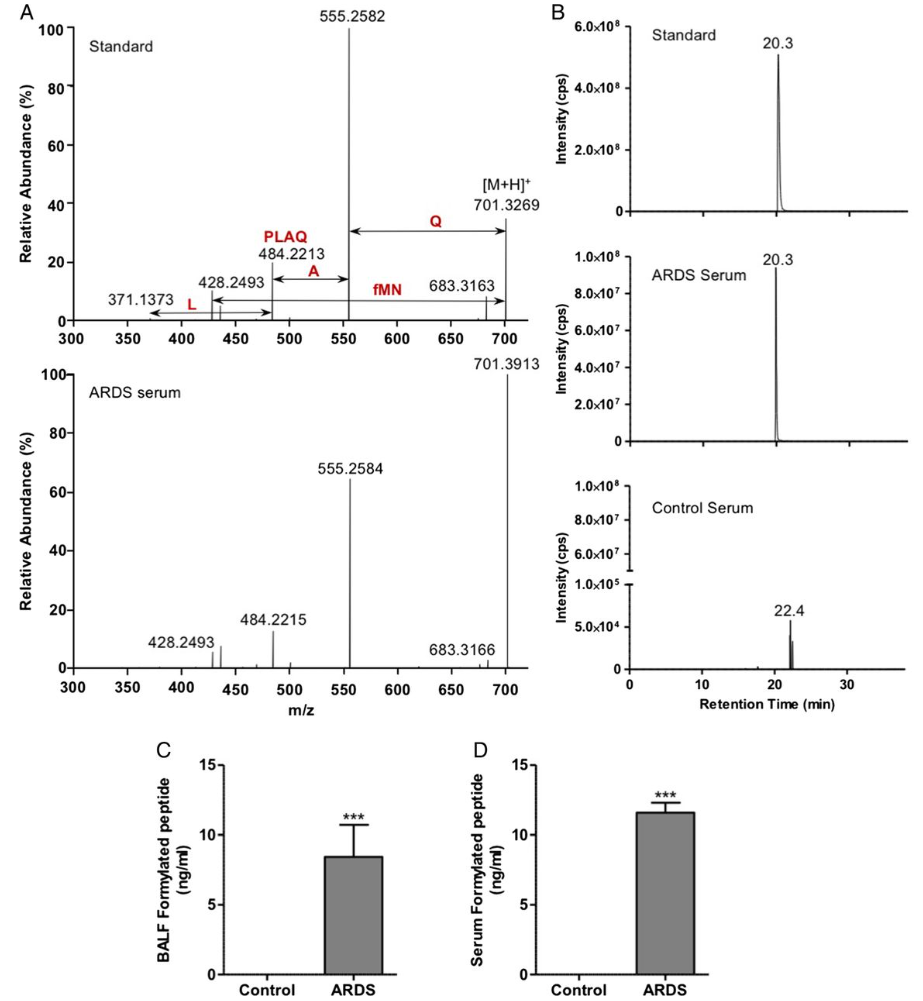Formylation Proteomics Service
- Identify formylated peptides and precise modification sites
- Quantify formylation levels across biological conditions
- Assess dynamic changes in formylation in response to treatment or environmental stimuli
- Investigate functional implications through pathway and interaction analysis
Post-translational modifications (PTMs) serve as critical regulators of protein function, affecting activity, stability, localization, and protein–protein interactions. Among these modifications, lysine formylation has recently emerged as a significant, yet underexplored, modification with broad implications in gene expression regulation, metabolism, aging, and disease progression. Formylation involves the covalent addition of a formyl group (-CHO) to the ε-amino group of lysine residues. This small but impactful chemical change can alter the local charge and hydrogen bonding properties of proteins, affecting their interaction with DNA, RNA, or other proteins. Formylation may compete with other lysine-targeted PTMs, such as acetylation, methylation, or ubiquitination, indicating a potential crosstalk mechanism that adds another layer of regulation to cellular signaling networks. Lysine formylation has been identified on histones, metabolic enzymes, transcription factors, and structural proteins, suggesting its involvement in chromatin remodeling, transcriptional control, and cellular stress responses.
Despite its growing biological importance, formylation remains technically challenging to study due to its low abundance, chemical lability, and lack of highly specific antibodies. Mass spectrometry (MS)-based proteomics, combined with optimized sample preparation and enrichment strategies, has become the method of choice for site-specific and quantitative analysis of formylation across biological systems.
Service at MtoZ Biolabs
To meet the growing need for in-depth, high-throughput formylation profiling, MtoZ Biolabs offers a specialized Formylation Proteomics Service. Our Formylation Proteomics Service platform integrates cutting-edge nano-LC-MS/MS, optimized enrichment protocols, and expert-level data analysis to help you:
We utilize customized workflows to deliver comprehensive, reproducible data tailored to your research goals.
Analysis Workflow
1. Sample Preparation
Proteins are extracted, denatured, reduced, alkylated, and enzymatically digested into peptides.
2. Formylated Peptide Enrichment
Enrichment is performed using anti-formyllysine antibodies or optimized chemical strategies to isolate modified peptides.
3. LC-MS/MS Analysis
Enriched peptides are analyzed using high-resolution mass spectrometry for accurate identification and site localization.
4. Data Processing
Raw data are processed to identify formylated peptides, localize modification sites, and quantify differences across samples.
5. Bioinformatics Interpretation
Identified formylation events are mapped to pathways, biological processes, and potential crosstalk with other PTMs.
Service Advantages
✔️Advanced Analysis Platform: MtoZ Biolabs established an advanced Formylation Proteomics Service platform, guaranteeing reliable, fast, and highly accurate analysis service.
✔️Comprehensive PTM Expertise: Decades of experience in PTM enrichment, analysis, and cross-modification profiling across diverse biological systems.
✔️One-Stop Service Model: From project design and sample processing to data analysis and reporting, we deliver fully integrated workflows under one roof.
✔️Customizable Experimental Design: Flexible enrichment strategies, labeling options, and instrument parameters tailored to your sample type and research goals.
Applications
1. Basic Biological Research
Investigate the functional roles of formylation in cellular processes such as chromatin remodeling, transcriptional regulation, protein–protein interactions, and metabolic control.
2. Disease Mechanism Exploration
Profile differential formylation patterns between healthy and diseased states to uncover PTM-driven regulatory pathways involved in inflammation, oxidative stress, cellular senescence, or metabolic dysfunction.
3. Drug Development
Evaluate how small molecules, epigenetic regulators, or metabolic interventions influence global or site-specific lysine formylation in cellular and preclinical models.
4. Target Discovery and Validation
Identify novel formylated proteins or modification sites associated with disease progression or therapeutic response, and validate their potential as drug targets or pharmacodynamic biomarkers.
Case Study
Formylated Peptides as Inflammatory Drivers in ARDS
A study identified elevated levels of mitochondrial formylated peptides in the bronchoalveolar lavage fluid and serum of patients with acute respiratory distress syndrome (ARDS) using LC-MS/MS. These peptides were shown to activate neutrophils and promote chemotaxis via formyl peptide receptor 1 (FPR1). In mouse models of sterile lung injury, both genetic deletion and pharmacological inhibition of FPR1 attenuated inflammation. This research highlights the biological relevance of formylated peptides in inflammatory lung disease and underscores the utility of mass spectrometry-based formylation analysis in uncovering disease-associated PTM mechanisms.

Figure 1. Elevation of Formylated N-terminal Peptides in Patients with Acute Respiratory Distress Syndrome (ARDS)
Deliverables
1. Comprehensive Experimental Details
2. Materials, Instruments, and Methods
3. Total Ion Chromatogram & Quality Control Assessment (project-dependent)
4. Data Analysis, Preprocessing, and Estimation (project-dependent)
5. Bioinformatics Analysis
6. Raw Data Files
With advanced analytical platforms and a team experienced in PTM proteomics, MtoZ Biolabs is here to support your discovery—from precise site identification to functional insight. Contact us today to discuss your project or request a custom quote.
How to order?







